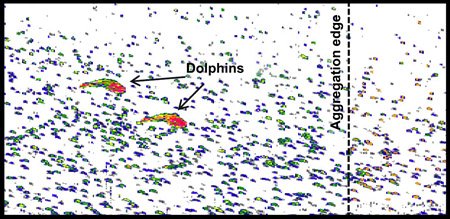Undersea robot reveals 'schools' of animals in deep scattering layers
Throughout the world ocean, animals congregate at certain depths, forming layers that can be hundreds of meters thick and may extend horizontally for dozens or even hundreds of kilometers. Because these dense layers of animals reflect sound waves, they are sometimes called "sound-scattering layers" or "deep scattering layers" (though they can occur near the sea surface). A new paper in Limnology and Oceanography shows that, rather than consisting of a random mixture of animals, these layers contain discrete groups or "schools" of squids, fishes, and crustaceans.

Deep scattering layers were first recognized during World War II, when sonar technicians observed their sound pulses bouncing off a "false seafloor" that actually consisted of millions of small fish or other animals. Over the following decades, marine biologists towed nets through the layers, bounced sound off them using ship-board sonar systems, and even observed them using small submarines. This research suggested that the layers were sometimes made up of one dominant type of animal but more often comprised a mixture of different animals.
Read more at: https://phys.org/news/2017-07-undersea-robot-reveals-schools-animals.html#jCp
For more ocean and rov/auv robotics news, follow and up vote!